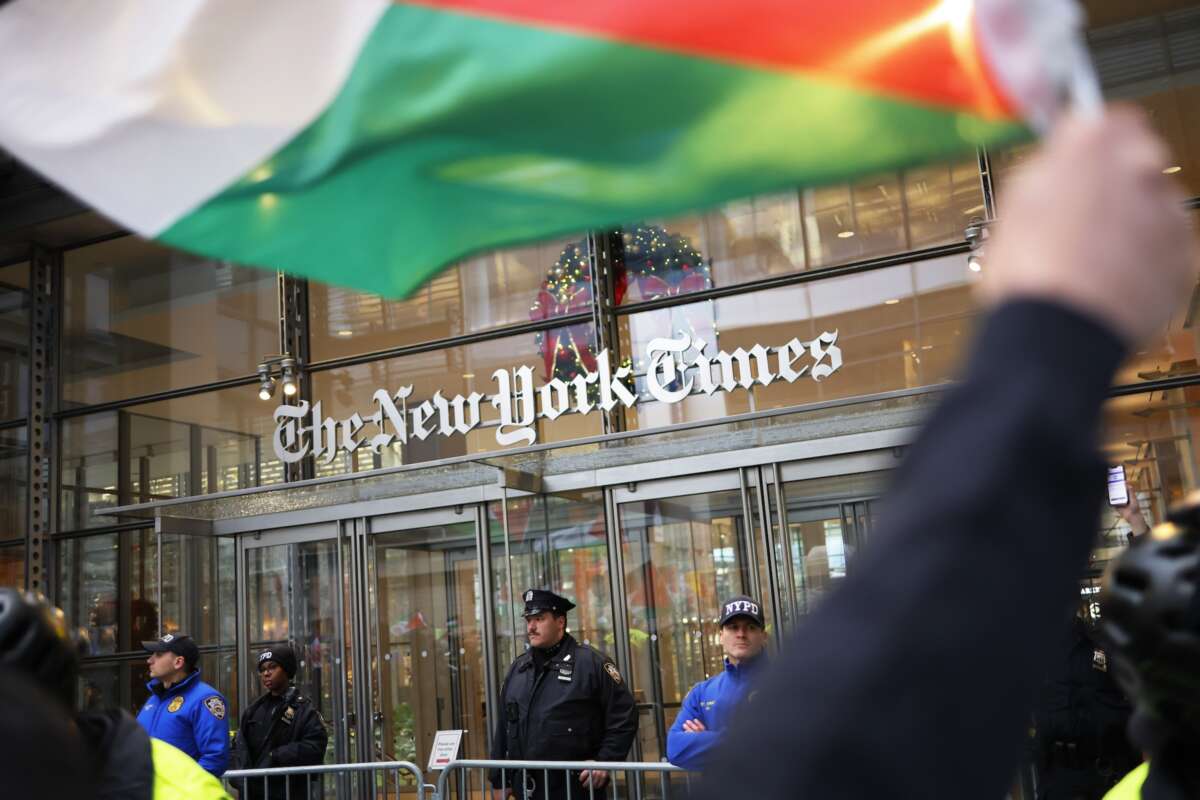Did you know that Truthout is a nonprofit and independently funded by readers like you? If you value what we do, please support our work with a donation.
The New York Times has a policy of systematically censoring words like “genocide” and “ethnic cleansing” in its coverage of Israel’s genocidal assault of Gaza, according to an internal memo obtained by The Intercept this week.
The Times memo instructs its journalists to avoid using the terms “genocide,” “ethnic cleansing” and “refugee camps” when writing about Palestine. It directs them to steer clear of referring to areas of Palestine as “occupied territory” — and, even further, discourages referring to Palestine as “Palestine” whatsoever. In addition, the memo claims that words like “slaughter,” “massacre” and “carnage” are often too emotional to describe Israel’s bombardment of Gaza.
The memo was written by Times standards editor Susan Wessling and international editor Philip Pan and their employees, and says its aim is to “offe[r] guidance” on terms the paper has “grappled with” since October, when Israel’s current siege of Gaza commenced.
If The Intercept’s findings are accurate, the barring of these terms from Times coverage reflects an approach to reporting on Gaza and Palestine that ignores the historical and contemporary reality of Israel’s violent repression of Palestinians.
“I think it’s the kind of thing that looks professional and logical if you have no knowledge of the historical context of the Palestinian-Israeli conflict,” an anonymous Times newsroom worker told The Intercept. “But if you do know, it will be clear how apologetic it is to Israel.”
Scholars and advocates across the world have said that Israel is clearly committing genocide, while Israeli government leaders have essentially admitted that their goal is to carry out ethnic cleansing of Gaza. Refusing to acknowledge that Palestine is “occupied territory” or even to use the word “Palestine,” meanwhile, is a way to refuse recognition of the state of Palestine — a longtime tactic of Israel and its allies to even further deny the rights of Palestinians to their homes and allow Israel to claim ownership of the territory.
Restriction of the use of “refugee camps,” meanwhile, flouts UN classifications of refugee camps spread across Gaza. These camps house hundreds of thousands of Palestinians, many of whom are the survivors and descendants of the 1948 Nakba, in which Zionist militants killed over 100 Palestinians and forced at least 750,000 more out of their homes in order to create the state of Israel.
Meanwhile, an analysis of coverage by The New York Times, Los Angeles Times and The Washington Post on Gaza published in The Intercept earlier this year shows that the three outlets used words like “slaughter” or “massacre” to refer to the killing of Israelis nearly 200 times in the first six weeks after the October 7 attack, while using the same words only five times total to refer to Palestinians. This is despite the fact that the amount of Palestinians Israel had killed at the time was already 20 times the amount of Israelis who were killed in the Hamas attack.
This week’s Intercept report similarly found that, while the memo explicitly allows writers to refer to Hamas fighters as “terrorists” when “describing attacks on civilians,” it does not refer to Israel’s actions as “terrorism” even amid extensive evidence that Israeli forces are consistently killing and targeting civilians.
Sources at the Times told The Intercept that the memo is another way that the supposed paper of record is skewing its coverage to favor Israel as Israeli forces massacre tens of thousands of civilians, a large portion of them children, and drive Palestinians out of their homes. The avoidance of the term “occupied territories,” one staffer said, flattens the issue into one of just the last six months, rather than one spanning decades of Israel’s occupation.
“You are basically taking the occupation out of the coverage, which is the actual core of the conflict,” the source said. “It’s like, ‘Oh let’s not say occupation because it might make it look like we’re justifying a terrorist attack.’”
The memo’s contents are a glimpse into a newsroom that has already been heavily criticized by readers and fellow journalists for its bias toward Israel. A recent analysis by advocates against Israel’s occupation found that the Times quotes Israelis at double the rate it quotes Palestinians, and mentions Israel and Israelis far more than it mentions Palestinians or Gaza, even as Israeli forces have pushed the Palestinian death toll above 33,000 people.
Media that fights fascism
Truthout is funded almost entirely by readers — that’s why we can speak truth to power and cut against the mainstream narrative. But independent journalists at Truthout face mounting political repression under Trump.
We rely on your support to survive McCarthyist censorship. Please make a tax-deductible one-time or monthly donation.
